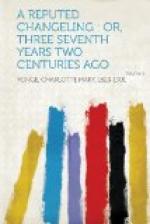“Oh! no, no,” said Anne, almost ready for a hysterical laugh, yet letting the old man seat himself, and then dropping on her knees before him, for she could hardly stand, “it is worse than that, sir; I know who it was who did that thing.”
“Well, who?” he said hastily; “why have you kept it back so long and let an innocent man get into trouble?”
“O Sir Philip! I could not help it. Forgive me;” and with clasped hands, she brought out the words, “It was your son, Mr. Archfield;” and then she almost collapsed again.
“Child! child! you are ill; you do not know what you are saying. We must have you to bed again. I will call your uncle.”
“Ah! sir, it is only too true;” but she let him fetch her uncle, who was sure to be at his devotions in a kind of oratory on the farther side of the hall. She had not gone to him first, from the old desire to keep him clear of the knowledge, but she longed for such support as he might give her, or at least to know whether he were very angry with her.
The two old men quickly came back together, and Dr. Woodford began, “How now, niece, are you telling us dreams?” but he broke off as he saw the sad earnest of her face.
“Sir, it is too true. He charged me to speak out if any one else were brought into danger.”
“Come,” said Sir Philip, testily; “don’t crouch grovelling on the floor there. Get up and let us know the meaning of this. Good heavens! the lad may be here any day.”
Anne had much rather have knelt where she was, but her uncle raised her, and placed her in a chair, saying, “Try to compose yourself, and tell us what you mean, and why it has been kept back so long.”
“Indeed he did not intend it,” pleaded Anne; “it was almost an accident—to protect me—Peregrine was—pursuing me.”
“Upon my word, young mistress,” burst out the father, “you seem to have been setting all the young fellows together by the ears.”
“I doubt if she could help it,” said the Doctor. “She tried to be discreet, but it was the reason her mother—”
“Well, go on,” interrupted poor Sir Philip, too unhappy to remember manners or listen to the defence; “what was it? when was it?”
Anne was allowed then to proceed. “It was the morning I went to London. I went out to gather some mouse-ear.”
“Mouse-ear! mouse-ear!” growled he. “Some one else’s ear.”
“It was for Lady Oglethorpe.”
“It was,” said her uncle, “a specific, it seems, for whooping-cough. I saw the letter, and knew—”
“Umph! let us hear,” said Sir Philip, evidently with the idea of a tryst in his mind. “No wonder mischief comes of maidens running about at such hours. What next?”
The poor girl struggled on: “I saw Peregrine coming, and hoping he would not see me, I ran into the keep, meaning to get home by the battlements out of his sight, but when I looked down he and Mr. Archfield were fighting. I screamed, but I don’t think they heard me, and I ran down; but I had fastened all the doors, and I was a long time getting out, and by that time Mr. Archfield had dragged him to the vault and thrown him in. He was like one distracted, and said it must be hidden, or it would be the death of his wife and his mother, and what could I do?”




